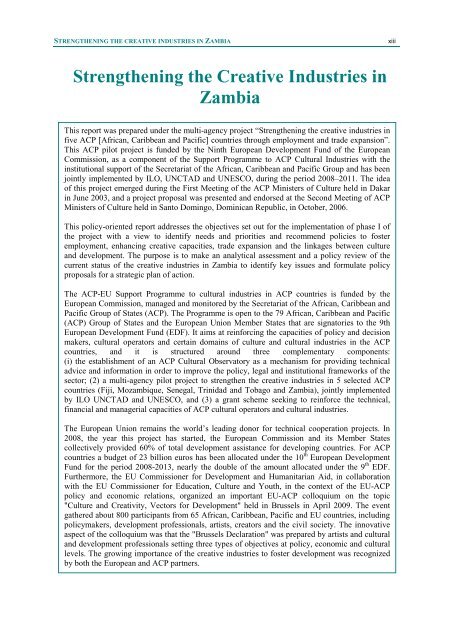Strengthening the Creative Industries in Zambia - Unctad
Strengthening the Creative Industries in Zambia - Unctad
Strengthening the Creative Industries in Zambia - Unctad
Create successful ePaper yourself
Turn your PDF publications into a flip-book with our unique Google optimized e-Paper software.
STRENGTHENING THE CREATIVE INDUSTRIES IN ZAMBIA xiii<br />
<strong>Streng<strong>the</strong>n<strong>in</strong>g</strong> <strong>the</strong> <strong>Creative</strong> <strong>Industries</strong> <strong>in</strong><br />
<strong>Zambia</strong><br />
This report was prepared under <strong>the</strong> multi-agency project “<strong>Streng<strong>the</strong>n<strong>in</strong>g</strong> <strong>the</strong> creative <strong>in</strong>dustries <strong>in</strong><br />
five ACP [African, Caribbean and Pacific] countries through employment and trade expansion”.<br />
This ACP pilot project is funded by <strong>the</strong> N<strong>in</strong>th European Development Fund of <strong>the</strong> European<br />
Commission, as a component of <strong>the</strong> Support Programme to ACP Cultural <strong>Industries</strong> with <strong>the</strong><br />
<strong>in</strong>stitutional support of <strong>the</strong> Secretariat of <strong>the</strong> African, Caribbean and Pacific Group and has been<br />
jo<strong>in</strong>tly implemented by ILO, UNCTAD and UNESCO, dur<strong>in</strong>g <strong>the</strong> period 2008–2011. The idea<br />
of this project emerged dur<strong>in</strong>g <strong>the</strong> First Meet<strong>in</strong>g of <strong>the</strong> ACP M<strong>in</strong>isters of Culture held <strong>in</strong> Dakar<br />
<strong>in</strong> June 2003, and a project proposal was presented and endorsed at <strong>the</strong> Second Meet<strong>in</strong>g of ACP<br />
M<strong>in</strong>isters of Culture held <strong>in</strong> Santo Dom<strong>in</strong>go, Dom<strong>in</strong>ican Republic, <strong>in</strong> October, 2006.<br />
This policy-oriented report addresses <strong>the</strong> objectives set out for <strong>the</strong> implementation of phase I of<br />
<strong>the</strong> project with a view to identify needs and priorities and recommend policies to foster<br />
employment, enhanc<strong>in</strong>g creative capacities, trade expansion and <strong>the</strong> l<strong>in</strong>kages between culture<br />
and development. The purpose is to make an analytical assessment and a policy review of <strong>the</strong><br />
current status of <strong>the</strong> creative <strong>in</strong>dustries <strong>in</strong> <strong>Zambia</strong> to identify key issues and formulate policy<br />
proposals for a strategic plan of action.<br />
The ACP-EU Support Programme to cultural <strong>in</strong>dustries <strong>in</strong> ACP countries is funded by <strong>the</strong><br />
European Commission, managed and monitored by <strong>the</strong> Secretariat of <strong>the</strong> African, Caribbean and<br />
Pacific Group of States (ACP). The Programme is open to <strong>the</strong> 79 African, Caribbean and Pacific<br />
(ACP) Group of States and <strong>the</strong> European Union Member States that are signatories to <strong>the</strong> 9th<br />
European Development Fund (EDF). It aims at re<strong>in</strong>forc<strong>in</strong>g <strong>the</strong> capacities of policy and decision<br />
makers, cultural operators and certa<strong>in</strong> doma<strong>in</strong>s of culture and cultural <strong>in</strong>dustries <strong>in</strong> <strong>the</strong> ACP<br />
countries, and it is structured around three complementary components:<br />
(i) <strong>the</strong> establishment of an ACP Cultural Observatory as a mechanism for provid<strong>in</strong>g technical<br />
advice and <strong>in</strong>formation <strong>in</strong> order to improve <strong>the</strong> policy, legal and <strong>in</strong>stitutional frameworks of <strong>the</strong><br />
sector; (2) a multi-agency pilot project to streng<strong>the</strong>n <strong>the</strong> creative <strong>in</strong>dustries <strong>in</strong> 5 selected ACP<br />
countries (Fiji, Mozambique, Senegal, Tr<strong>in</strong>idad and Tobago and <strong>Zambia</strong>), jo<strong>in</strong>tly implemented<br />
by ILO UNCTAD and UNESCO, and (3) a grant scheme seek<strong>in</strong>g to re<strong>in</strong>force <strong>the</strong> technical,<br />
f<strong>in</strong>ancial and managerial capacities of ACP cultural operators and cultural <strong>in</strong>dustries.<br />
The European Union rema<strong>in</strong>s <strong>the</strong> world’s lead<strong>in</strong>g donor for technical cooperation projects. In<br />
2008, <strong>the</strong> year this project has started, <strong>the</strong> European Commission and its Member States<br />
collectively provided 60% of total development assistance for develop<strong>in</strong>g countries. For ACP<br />
countries a budget of 23 billion euros has been allocated under <strong>the</strong> 10 th European Development<br />
Fund for <strong>the</strong> period 2008-2013, nearly <strong>the</strong> double of <strong>the</strong> amount allocated under <strong>the</strong> 9 th EDF.<br />
Fur<strong>the</strong>rmore, <strong>the</strong> EU Commissioner for Development and Humanitarian Aid, <strong>in</strong> collaboration<br />
with <strong>the</strong> EU Commissioner for Education, Culture and Youth, <strong>in</strong> <strong>the</strong> context of <strong>the</strong> EU-ACP<br />
policy and economic relations, organized an important EU-ACP colloquium on <strong>the</strong> topic<br />
"Culture and Creativity, Vectors for Development" held <strong>in</strong> Brussels <strong>in</strong> April 2009. The event<br />
ga<strong>the</strong>red about 800 participants from 65 African, Caribbean, Pacific and EU countries, <strong>in</strong>clud<strong>in</strong>g<br />
policymakers, development professionals, artists, creators and <strong>the</strong> civil society. The <strong>in</strong>novative<br />
aspect of <strong>the</strong> colloquium was that <strong>the</strong> "Brussels Declaration" was prepared by artists and cultural<br />
and development professionals sett<strong>in</strong>g three types of objectives at policy, economic and cultural<br />
levels. The grow<strong>in</strong>g importance of <strong>the</strong> creative <strong>in</strong>dustries to foster development was recognized<br />
by both <strong>the</strong> European and ACP partners.

















